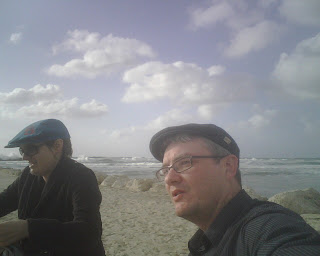Reflections on My High Holy Days Experiences in Israel

(Picture note: A view from the Blaustein Hall where HUC's High Holy Days services take place. Post note: The post below comes from a journal entry for my Liturgy class, but I felt the concepts important enough to share with a wider audience.)
For all the possible directions this reflection could go, I am forced after these holidays to return over and over to the principle of not being a burden to the community.
I assume that the memory that will live the longest with most of us that attended HUC’s Yom Kippur Day services will be that of the congregant that required medical care during the service. Certainly the sight of her face growing taut and corpselike and her eyes rolling back in her head remain in my waking memories as well as my nightmares. Those of us in the choir that had the most direct view thought that her second incident was a sure precursor to death. I don’t say this to be dramatic. I have worked in the medical industry for over a decade including a dialysis ward. This experience was terrifying and nightmarish.
Surely we should have compassion for such events. From the objective observation of the actions of those in the congregation, most especially HUC students, not only did we have compassion but as well a pragmatic wit. But within that compassion, after the first incident of the day this congregant was urged to seek medical treatment, to leave the premises, to end her fast . . .
She did none of these other than drinking a small amount of the water offered. The first incident was one worthy of compassion and all the positive energy given by the community. Of course the second incident also brought compassion and positive energy, as is just in the face of illness. Yet an additional line, one which is much more difficult and controversial to mention, was also crossed. This congregant was not of sound mind and body to fast. She should not have fasted, even by the most strict halachic standards, and in choosing to do so she made herself a burden to the community.
So much amazing and beautiful happened during the Chaggim. My wife and I said many a Shehechiyanu as we experienced the holidays together in Eretz Israel for the first time. The High Holiday’s choir transformed from a nerve-wracking group, most of whom in the tenor section had never read music or sang in a choir, to one that sounded quite good and blessed the community. I heard one of the world’s great cantors and pedagogues share his brilliance with us—a pleasure that with the specter of retirement may not be offered to many at Abraham Geiger that follow me.
Yet I am haunted by the hardest lessons learned. I hope that my fellow students are able to as well learn the lesson that this business of Jewish leadership is as much a Project Manager position and a spiritual leadership position. My reflection of these High Holy Days remind me that water needs to be nearby and available in seconds rather than in minutes. My lessons learned in the many Drashot seem to be overwhelmed by the questions of “Where is the nearest defibrillator,” and “should I have a medic on staff?”
I will pass on the lessons through my own Drashot. The desire to observe is commendable, but not at the expense of your body mind or spirit. Being a part of a community of observance, such as the observance of fasting, is a mitzvah. But sanity and ethical behavior is also a mitzvah, including turning the self-reflection that our tradition demands into an honest enough reflection to know when we are not capable of—even more, under no circumstances should—participate in certain traditions.

Comments